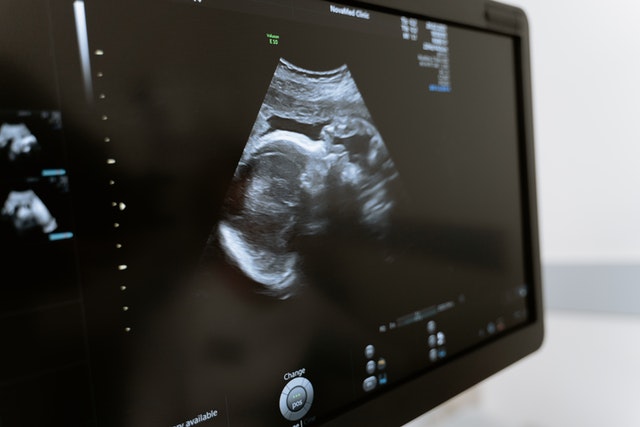
Acute fatty liver of pregnancy (AFLP) is a rare, often fatal condition that affects women in the third trimester or early days after birth. This condition, characterized by white puss-like droplets in the fluid surrounding the cornea, has been connected to a problem with fetuses’ fatty acid metabolism. Because it shares characteristics with other common diseases such as pre-eclampsia, viral hepatitis, and cholestasis of pregnancy, early detection of AFLP can be difficult.
A complete medical history and physical examination and associated laboratory and imaging findings are typically sufficient to establish the diagnosis; however, liver biopsy is rarely required. Access to timely obstetric care and prompt delivery are critical for optimal fetal-maternal outcomes, which remain the mainstay therapy for AFLP.
What are the Symptoms of Fatty Liver in Pregnancy?
Several possible symptoms are associated with fatty liver in pregnancy, though not all women will experience them. One of the most common is fatigue, which can be accompanied by malaise, nausea, and vomiting. Some women may also develop jaundice, dark urine, and light-colored stools.
Women may experience abdominal pain, shortness of breath, and mental confusion in more severe cases. If you are pregnant and experiencing any of these symptoms, it is important to speak with your doctor as soon as possible.
What Causes Fatty Liver in Pregnancy?
There is no one definitive answer to this question as the condition can be caused by various factors. One theory is caused by an interruption in the normal metabolism of fatty acids during pregnancy. This can be due to several different things, including pre-eclampsia, viral hepatitis, or cholestasis of pregnancy. In some cases, there may be no obvious underlying cause.
How is Fatty Liver in Pregnancy Diagnosed?
If you are experiencing any of the symptoms associated with fatty liver in pregnancy, it is important to speak with your doctor as soon as possible. They will likely take a complete medical history and perform a physical examination. In some cases, additional testing may be necessary to confirm the diagnosis. This may include blood tests, liver function tests, and imaging studies. In rare cases, a liver biopsy may be necessary.
How to Prevent Fatty Liver in Pregnancy?
Eating a Healthy Diet
One of the best ways to prevent fatty liver in pregnancy is to eat a healthy diet. Diet plays a big role in curing and reversing the effects of fatty liver. This means eating plenty of fruits, vegetables, whole grains, and lean proteins. It is also important to limit your saturated and trans fats, sugar, and salt intake. If you are having trouble eating a balanced diet, several resources are available to help you make healthy choices.
Getting Regular Exercise
In addition to eating a healthy diet, it is also important to get regular exercise. Exercise can help to reduce the amount of fat stored in the liver and improve overall liver function. It is important to speak with your doctor before starting any new exercise regimen.
Maintain a Healthy Weight
One of the best things you can do to prevent fatty liver in pregnancy is to maintain a healthy weight. This means eating a balanced diet and getting regular exercise. If you are overweight or obese, speak with your doctor about ways to safely lose weight before becoming pregnant,
Avoid Alcohol
Another important thing you can prevent fatty liver in pregnancy is avoiding alcohol. If you are pregnant or trying to become pregnant, it is important to abstain from alcohol completely.
Get regular prenatal care
Getting regular prenatal care is another important way to prevent fatty liver in pregnancy. This means seeing your doctor for regular checkups and having any recommended tests or screenings. Early detection and treatment of any underlying conditions is key to preventing fatty liver in pregnancy.
Observe any Signs of Liver Disease
If you have any signs or symptoms of liver disease, it is important to speak with your doctor as soon as possible. This includes yellowing of the skin or eyes, dark urine, fatigue, nausea, and vomiting. Early detection and treatment of liver disease is key to preventing fatty liver in pregnancy.
What are the Treatment Options for Fatty Liver in Pregnancy?
The mainstay of treatment for fatty liver in pregnancy is delivery. In most cases, this will be done via cesarean section. Once the baby is born, the mother’s symptoms typically resolve within a few days. In some cases, additional treatment may be necessary. This may include IV fluids, blood transfusions, or liver transplants. If you are pregnant and have been diagnosed with fatty liver, it is important to speak with your doctor about your specific treatment options.

How Does a Fatty Liver Affect the Growth of your Baby?
A fatty liver in pregnancy can cause several problems for both the mother and the baby. It can also cause stomach pains during pregnancy.. The baby will be born healthy and without any complications in most cases. However, there is a risk for preterm labor, low birth weight, and stillbirth. In rare cases, the mother may develop hepatic failure or death. If you are pregnant and have been diagnosed with fatty liver, it is important to speak with your doctor about the risks and benefits of continuing the pregnancy.
Can you Suffer Fatty Liver in the Subsequent Pregnancy?
It is possible to suffer from the fatty liver in subsequent pregnancies. However, the risk is significantly lower if you maintain a healthy weight and avoid alcohol. If you are pregnant and have been diagnosed with fatty liver, it is important to speak with your doctor about your specific risks.
What Trimester Does Fatty Liver Occur?
Fatty liver in pregnancy can occur at any time during the pregnancy. However, it is most common during the third trimester. This is because the baby is growing the most during this time and putting a strain on the mother’s organs. In the first and second trimesters, the baby is much smaller and doesn’t require as many nutrients. This means that the mother’s organs are not under as much stress.
What does Research Say About Fatty Liver in Pregnancy?
There is still much unknown about fatty liver in pregnancy. However, scientists are working hard to learn more about this condition. In a recent study, researchers looked at data from nearly 500 women diagnosed with fatty liver during pregnancy.
They found that most of these women delivered healthy babies without any complications. Additionally, they found that the risk for fatty liver in subsequent pregnancies was significantly lower if the mother maintained a healthy weight and avoided alcohol. These findings suggest that fatty liver in pregnancy is not as dangerous as previously thought and that there are ways to prevent it.
Is There a Definitive Cure for Fatty Liver in Pregnancy?
Unfortunately, there is no definitive cure for fatty liver in pregnancy. In most cases, the only treatment is delivery. In some cases, additional treatments may be necessary. However, these are typically only temporary measures to help alleviate symptoms and improve the mother’s and baby’s health.
Can Fatty Liver Develop to Liver Failure?
Yes, in rare cases, fatty liver can develop into liver failure. This is more likely to occur if the mother has other underlying health conditions. If you are pregnant and have been diagnosed with fatty liver, it is important to speak with your doctor about the risks and benefits of continuing the pregnancy.
What Are The Long-Term Effects of Fatty Liver in Pregnancy?
There is still much unknown about the long-term effects of fatty liver in pregnancy. However, scientists believe that most women who suffer from this condition will not experience any long-term effects. In some cases, the mother may be at an increased risk for developing the liver disease later in life. However, this is rare and typically only occurs if the mother has other underlying health conditions.
What are the Danger Signs of Fatty Liver Disease?
If you are pregnant and have been diagnosed with fatty liver, it is important to monitor your health closely. You should speak with your doctor if you experience any of the following symptoms:
- Jaundice (yellowing of the skin or eyes)
- Abdominal pain
- Nausea or vomiting
- Loss of appetite
- Weight loss
- Fatigue
If you experience any of these symptoms, it is important to seek medical attention immediately. These could be signs of a more serious condition, such as liver failure.
Can your Baby Grow to Full Term?
In most cases, yes. In most cases, women who have fatty liver will carry their baby to full term without any complications. However, it is important to speak with your doctor about your specific risks.
Can Medications Increase the Risk of Fatty Liver?
Certain medications can increase the risk of developing fatty liver. These include:
- Birth control pills
- Estrogen replacement therapy
- Tamoxifen (a cancer medication)
If you take any of these medications, it is important to speak with your doctor about the risks and benefits. In some cases, it may be necessary to discontinue the use of the medication.
Conclusion
Fatty liver in pregnancy is a relatively common condition that usually does not pose a serious threat to the mother or baby. However, it is important to speak with your doctor about your specific risks. In some cases, additional treatments may be necessary. Additionally, it is important to monitor your health closely for any signs of a more serious condition.
Sources:
1. https://www.ncbi.nlm.nih.gov/pubmed/19556734
2. https://www.ncbi.nlm.nih.gov/pubmed/17651080
3. https://www.urmc.rochester.edu/encyclopedia/content.aspx?ContentTypeID=90&ContentID=P02465


Leave a Reply